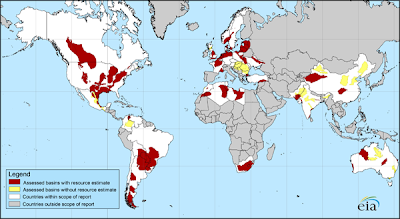by War News Updates Editor @ War News Updates: Breaking Our Dependence On OPEC Oil
This site brings us this awesome map:

World Shale Gas Resources: An Initial Assessment of 14 Regions Outside the United States. EIA
Thought We Were Running Out Of Fossil Fuels? New Technology Means Britain And The U.S. Could Tap Undreamed Reserves Of Gas And Oil -- Daily Mail
Read more @ War News Updates: Breaking Our Dependence On OPEC Oil
The problem I see is that, while other governments do everything possible to take advantage of these new energy sources, our government is doing everything possible to stifle that development.
Oh yeah, and noticeably absent from the map are areas in the far north where massive oil reserves are known to be located! It does not show the massive places in northern Russia that that government is taking measure to drill for.

This site brings us this awesome map:

World Shale Gas Resources: An Initial Assessment of 14 Regions Outside the United States. EIA
Thought We Were Running Out Of Fossil Fuels? New Technology Means Britain And The U.S. Could Tap Undreamed Reserves Of Gas And Oil -- Daily Mail
Read more @ War News Updates: Breaking Our Dependence On OPEC Oil
The problem I see is that, while other governments do everything possible to take advantage of these new energy sources, our government is doing everything possible to stifle that development.
Oh yeah, and noticeably absent from the map are areas in the far north where massive oil reserves are known to be located! It does not show the massive places in northern Russia that that government is taking measure to drill for.


